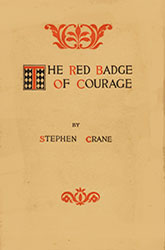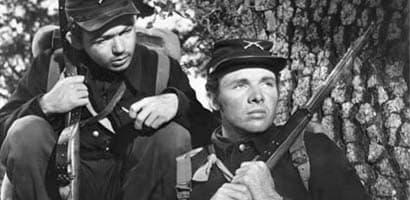The Red Badge of Courage
Critique • Quotes • Text • At the movies
 First edition, 1898
First edition, 1898First publication
1895
Literary form
Novel
Genres
Literary
Writing language
English
Author's country
United States
Length
Approx. 46,000 words
 Real war hero Audie Murphy, right, captures fear and bravery under fire in 1951 adaptation.
Real war hero Audie Murphy, right, captures fear and bravery under fire in 1951 adaptation. Many a discouraging word
The Red Badge of Courage (1951): Film, 69 minutes; director John Huston; writers Huston, Albert Brand; featuring Audie Murphy, Bill Mauldin, Andy Devine, Robert Easton
We'll never know how good John Houston's The Red Badge of Courage is, as the great director's adaptation of the great Civil War novel was drastically cut by the studio. The trimmed footage was apparently destroyed, so no director's cut will ever be available.
But those Hollywood butchers must have had some sensitivity because we still have a pretty good film of the book left. The studio also added a voice-over by James Whitmore to introduce and conclude the film, as well as to occasionally provide the main character's thoughts, quoting from the book directly to stress the connection with the literary classic. There is disagreement over how long the director's version was—anywhere from ninety minutes to well over two hours—but even at just sixty-nine minutes, the 1951 Red Badge catches the essence of Stephen Crane's meditation on war and individual valour.
"Meditation" may be too high-falutin' a word. Like the novel, the black-and-white film is deceptively simple. We follow a group of soldiers, one in particular—Henry Fleming—who obsesses about how he'll act under fire. And we're with him all the way, through the fearful anticipation, the exhilaration, the desperation and shame, and the manic overcompensation that passes as bravery.
Most surprising for me is the central acting job by Audie Murphy. As America's most decorated soldier of World War Two, Murphy is an heroic choice to play the cowardly youth of Red Badge. In his other movie roles he had always been earnestly appealing but barely adequate as an actor. In Houston's hands, he's everyman. The camera in close-up loves his every twitch, swagger and hollow stare.
Around him is an army of mainly unknown but skilled actors who bring home the ordinary recruit's personal perspective on fighting—both trivially and movingly. A cast of Gary Coopers or Jimmy Stewarts in this film would never have been able to give us this authentic experience.
If only they all had more time though. The story is raced through too quickly in this heavily edited version. Fleming's flight from the battlefield and his wandering around in the chaos behind the lines is especially condensed. We hardly have time for the impact of each scene to sink in. But still, all the scenes that we do get are staged brilliantly and filmed dramatically. No wonder Houston thought this was going to be his greatest cinematic achievement yet.
Part of what the studio—and apparently test audiences—objected to in Huston's cut was the bloody violence of the battle scenes. Some viewers, it seems, actual found it risible. Today of course we find the fighting, cleaned up by the studio, somewhat antiseptic as the injured and killed just fall in their tracks without the blasted bone and spattered blood of today's films.
The horror of warfare is a major part of the novel, and film has the opportunity to bring this home visually. Reference to blood is in the very title of both the film and book. But in this, as in other ways, Huston may have been ahead of his time, though the studio overruled him. Nonetheless, the battle scenes as edited are tremendous—confusing, smoky, frightening and yet coherent.
Battle scene and aftermath in 1951's The Red Badge of Courage.
We cannot know for sure, but we can imagine how the greater sweep and emotional effect allowed by a little longer running time could have raised this film to being one of the masterpieces of war movies.
Maybe. Or maybe not. For all we know, the studio may have saved Huston from delivering a bloated, over-the-top production that would undercut its genuine emotional impact. We'll never know.
In any case, we can appreciate The Red Badge of Courage as a minor classic in its present state.
— Eric

